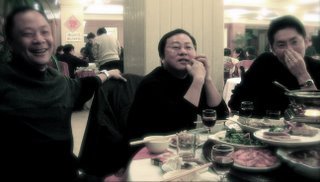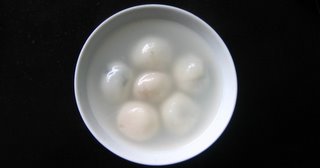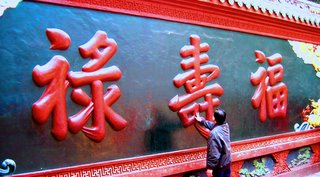
During the recent trip to Chengdu for Chinese New Year, as usual I met up with my high school friends for a drinking feast. We invited Teacher Chen, the head teacher of our class, to join us as well.
When we started our high school in 1986, Teacher Chen was given the chance for the first time to head a high school class. In today’s standard, Teacher Chen might have been considered a 愤青 (angry youth) then. She was idealistic, passionate, and silently angry at the establishment for giving the young teachers few opportunities to prove their capabilities.
1986 was an awkward yet exciting year for all of us. In Chengdu, jeans were still frowned upon and forbidden in school. Pop songs were being smuggled in from Hong Kong. Ballroom dance was just slowly sneaking back onto university campuses. Jing Yong’s martial arts fantasies, grouped together with other hand-copied fictions as corrupting and addictive, were completely off limit to the “good students”.
The school, eager to send more students to famous universities and improve its reputation, repeated the same old message of studying hard. But time was changing. At the New Year’s Eve party for 1987, a few of us danced disco, a dance considered belonging only to “hooligans”, on the creaky wooden floor in our classroom, under our classmates’ curious stares. No one was penalized afterwards.
Teacher Chen shielded us from much of the school’s criticism. Her mantra was “You have only one life. Live differently!”, which was such an invigorating message to us who had been trained all our lives to study and only study. Once, unsatisfied with our formulaic writing, she tasked us to write whatever we would want, on our lives, on our future, on our frustrations. For any one who wrote about their true thoughts and feelings, she gave a perfect score.
Another time, she let us decide on an unorthodox and highly tacky class slogan – To Live, Not Simply Living (生活,而不是活着). That slogan hanged over the blackboard for an entire semester. It was with her encouragement that we put on plays, staged a break dance performance for the school variety show, and sing pop (oh my) songs at the school singing competition.
We became good friends, highly inappropriate for teacher and students. A few of us close to her would sometimes study in her office, and report to her the latest impressionist poems or Freudian theories we had just picked on. One time we found her old love letters to the ex before her husband. When we confronted her, she blushed all over and told us we had gone too far.
Now looking back, I feel she needed us then as much as we needed her. We were all pushing along to see how far we could go. Alas, how blessed we were.
After high school, she and I continued correspondence, even after I went to America. Sometimes she would express envy at me living “freely”; sometimes she would tell me her frustration at not being able to do more, not able to win against the establishment. But in 1996 when I came out to her in a letter, she stopped writing.
It was only then I knew there’s a limit to everything that seemed too good to be true.
While waiting for her at the restaurant, my friends and I reminisced about the good old rebellious days in high school. When she finally arrived, it caused quite a stir. She had barely changed. After the warm greetings, she sat next to me, once her best student, at the dinner table.
We talked about our respective lives. She was now a special-grade teacher and had garnered many teaching awards. I asked about her students. The time is changing, she said; there were things off limit to them now but they were all doing great. I asked about her daughter who had just started a job in Singapore after graduation. The daughter missed home and wanted to move back, but Teacher Chen didn’t want her to get stuck in Chengdu, the slow-paced city which she had always considered only for those lacking ambition.
She asked what I was doing. I replied filmmaking and writing. She sighed, “If you keep on switching, how can you get far?” Then we moved on to talk about her other successful students who had gotten doctor’s degrees or were making lots of money.
I wanted to ask her then if she still taught her students To Live, Not Just Living. I wanted to tell her then that I’d always been true to our friendship, to her teaching that we should be living honestly and passionately. But my friends were falling off the chair from too much drinking, and Teacher Chen, with the pensive smile on her face, looked more and more distant.










